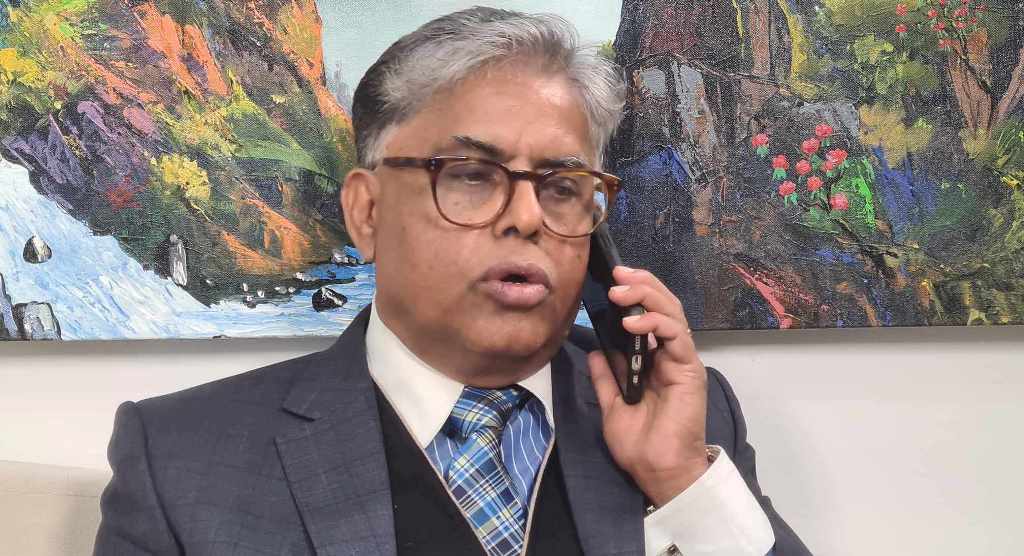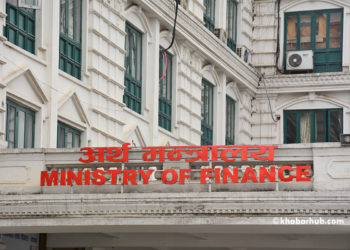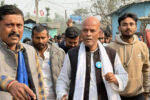KATHMANDU: Professor Dr. Gandhi Pandit, a senior advocate with extensive legal experience, is renowned for his expertise in law, particularly in company law.
He completed his higher education in law at Columbia University in the United States and has taught at Nepal Law Campus for over three decades. Pandit is also an active figure in Nepal’s legal profession.
Pandit, known for his strong opinions on contemporary legal issues, is currently attempting to shift the public discourse surrounding Rabi Lamichhane’s arrest case.
However, he maintains a neutral stance, asserting, “I am not Rabi Lamichhane’s lawyer.”
A senior advocate with specialized knowledge in company law, Pandit referenced an 1865 British legal precedent (Saloman v. Saloman) in a discussion with Khabarhub.
He explained, “The liability of an individual and a company is distinct. The money brought into a company does not directly belong to its shareholders, and personal property in a shareholder’s house is not considered company property.”
Pandit applied this principle to the case of Lamichhane, stating, “If GB Rai brought loans into the company, the loans belong to GB Rai. Just because GB Rai obtained it from a cooperative, others are not automatically liable. The responsibility lies with GB Rai.”
In an exclusive interview with Sangam Dhakal, Pandit discussed the legal basis for Rabi Lamichhane’s arrest, potential actions against him, and the street protests led by the Rastriya Swatantra Party (RSP).
We also asked Pandit for his thoughts on Inspector General of Police Basanta Bahadur Kunwar’s statement to the parliamentary committee, where Kunwar suggested that Rabi Lamichhane may appear innocent.
Here is an edited excerpt from the video interview with senior advocate Pandit:
You have been speaking in various media outlets regarding the arrest of RSP Chair Rabi Lamichhane, who is currently in the custody of the Kaski District Police on charges of cooperative fraud and organized crime. Are you involved in the team defending Rabi?
I have been commenting on legal matters in the media for some time, and when this issue arose, several outlets approached me for my views.
My statements about Rabi Lamichhane have been based solely on legal analysis, particularly regarding the law’s provisions on cooperative fraud and the actions that should be taken in such cases, both before and after his arrest.
What the IGP said in the committee may still have evidentiary value. If the case against Rabi is prosecuted, the IGP’s statement could potentially be used as part of the evidence.
However, I have not spoken as Rabi Lamichhane’s lawyer.
While some of Rabi’s supporters suggested that I should represent him, I chose not to.
Although as a lawyer, I have both the right and the duty to argue a case, there are other legal professionals who are more qualified and better suited to handle this particular case.
The law must be applied equally to all, regardless of one’s status—whether they are political leaders or ordinary citizens.
I spoke out on this matter because, as a lawyer, I believe in the right to justice and fairness for everyone, including Lamichhane.
How do you feel about the emergence of a new political party after the old parties failed to deliver, and the detention of RSP Chairman Lamichhane in a case of misappropriation of people’s savings or cooperative fraud?
This issue can be viewed from two perspectives—political and legal. I do not want to comment on the political aspect, as politics is a field where there are no absolute right or wrong answers.
It’s largely a matter of perspective. Some people see a glass as half full, while others see it as half empty.
From a legal standpoint, if a person is accused and there is evidence to suggest their involvement in a crime, the police can and should obtain a court-issued arrest warrant and detain the individual in judicial custody for further investigation.
Under the law, even buying stolen goods is considered a crime. In this case, Gorkha Media Chairman GB Rai allegedly brought money from the Suryadarshan Cooperative, and Rabi Lamichhane, as the Managing Director, had an executive role in overseeing transactions and signing minutes. Some people involved were also shareholders. Given this situation, does Rabi appear guilty? What does the law say?
I am a law graduate, and after retiring as a professor at the law campus after 35-36 years of teaching, including courses in company law, I believe it’s important to provide some clarification.
Looking at the facts, GB Rai allegedly brought money from the cooperative and transferred it to Gorkha Media’s account, presenting it as a personal loan.
Even though the law permits detention for up to 60 days, from the perspective of justice, there’s no reason to detain him for the entire duration unless necessary.
Once this money was deposited into the company’s account, it became the company’s property, not that of an individual.
Rabi Lamichhane, Chhabil Joshi, and others who were responsible for managing Gorkha Media’s finances are now accused of embezzling those funds.
Many people struggle to understand this concept, but it’s crucial to recognize that a company and its shareholders or directors are separate legal entities.
A company is a legal person in its own right. It is formed by two or more promoters who sign documents and register it with the company registrar.
Once incorporated, the company becomes a separate legal entity with its own assets and liabilities.
The company can buy property, open bank accounts, and even take out loans in its own name. It can also be sued as an entity.
However, even though a company is a separate legal entity, it cannot function on its own—it must be managed by its directors or representatives.
These individuals are responsible for running the company, and they can make decisions about how the company’s money is used.
That said, the liability of an individual is distinct from that of the company. The money that enters the company does not belong directly to the shareholders, and personal property belonging to shareholders is not considered part of the company’s assets.
This principle was established in the 1865 British case Salomon v. Salomon & Co., where a company called Salomon & Co. was incorporated.
The company took a loan, but when it couldn’t repay it, the bank attempted to seize the personal property of its director, Salomon.
Salomon argued that he and the company were separate legal entities, and therefore, his personal property could not be used to settle the company’s debts.
The lower court ruled in his favor, establishing the precedent that a company and its directors are distinct and that the company’s debts do not transfer to the personal assets of its shareholders. This is why companies are often referred to as “limited liability” entities.
Nepal’s legal framework follows this principle. You can take a loan in the name of a company, and although the loan is technically the company’s responsibility, the bank often requires personal guarantees from the shareholders or directors as well.
According to your statement, GB Rai brought money to Gorkha Media, whether by fraud, theft, or his own hard-earned money. Ravi Lamichhane became a shareholder by taking a certain percentage of the shares in Gorkha Media. If GB Rai brought the money through fraudulent means, does that mean Rabi is innocent? Are you suggesting Rabi is not guilty?
If GB Rai brought money to the company, that money belongs to GB Rai. No one else will be held responsible just because he brought the money, although he himself is under scrutiny for his actions.
This is not about Rabi being a shareholder in the company. The law clearly makes a distinction here—this is the “barrier” the law has set.
GB Rai did something wrong—he was the Chairman and brought the money from the cooperative through someone else.
Even if the money eventually was deposited into the company’s account, the question of legal responsibility depends on interpretation.
This isn’t my personal opinion but the interpretation of the law. If this legal principle weren’t in place, every time a company goes bankrupt, the shareholders would be held personally liable, and that would be problematic.
This issue has to be clarified further. If Rabi had been only an employee of Gorkha Media, then even if GB Rai brought the money and set up the TV channel, Rabi could have simply said he was just an emplyee. However, since Rabi is a shareholder in Gorkha Media, the situation is different.
Now, you may say that from today’s perspective, your explanation is valid regarding GB Rai’s actions.
But when the company was initially registered, there were no allegations of embezzlement against him.
At that time, the money coming into the company wasn’t viewed as fraudulent. If Rabi entered the company then, there was no indication of any wrongdoing by GB Rai.
Just as you were surprised to hear about the funds, anyone joining the company at that time could have been unaware of any embezzlement.
One question may arise: Where did this money come from? How did the money flow into the company?
But you cannot label Rabi as a criminal without asking those questions. When the money first came to Gorkha Media, there was no case against GB Rai.
He was a businessman, and the government issued him a license to run the media. If he were involved in fraud, why would the government have licensed Galaxy Media?
Clearly, the authorities must have believed in his integrity at that time. The company was registered, the TV channel was operational, and a bank account was opened in the company’s name. At that point, there was no reason to assume that he was involved in theft or fraud.
If we knew there was already an ongoing investigation into GB Rai at the time, then it would make sense to accuse him. But that wasn’t the case when the money first entered the company.
Therefore, it’s crucial to recognize that a company is a separate legal entity. The evidence might suggest that the directors colluded to bring money into the company, but that’s something for the investigation to uncover.
Under company law, the company and its shareholders are distinct. If we don’t adhere to this principle, business operations become impossible.
For example, if my son were to run a business, I wouldn’t want him to use the company to take advantage of my family’s wealth.
In 1865, the British House of Lords made a similar ruling in the Salomon v. Salomon case, establishing the legal distinction between a company and its directors.
If we ignore this distinction, business cannot function properly. This principle is applicable worldwide—whether in the U.S., the U.K., or India.
If a company fails to repay its debts, those debts cannot be transferred to its shareholders, which is why companies are referred to as limited liability entities.
What is your legal opinion on the grounds for Lamichhane’s arrest? Has a legal loophole been exploited in this case?
I am not Rabi’s lawyer, so I cannot speak definitively about any potential legal loopholes.
However, based on the legal grounds that have been presented so far and the report from the High-Level Parliamentary Inquiry Committee on Cooperatives, I can say that Rabi Lamichhane was neither a debtor nor a member of the cooperative.
He did not take any loans from the cooperative, nor did he receive any checks from them. Therefore, he is not directly implicated in the cooperative’s case.
What is evident, however, is that GB Rai brought money from the cooperative and gave it as a loan to the company.
This money was then deposited into Gorkha Media’s account, where Rabi, as a representative of the company, carried out the transactions.
Now, the question is: Did Rabi commit embezzlement? According to the High-Level Parliamentary Inquiry Committee, while there was no evidence of embezzlement in relation to the cooperative, there is a need to investigate whether any embezzlement occurred within the company.
It is within the company’s rights to investigate whether the money was misused or embezzled.
Has a legal loophole been exploited in this case?
If the police receive a complaint related to any charge, they can detain an individual with a court order for investigation.
Currently, Rabi is in judicial custody while the investigation continues. Whether or not charges will be formally filed, and whether this is a case of political revenge, remains to be seen.
As the investigation progresses, it will become clearer whether this is a legitimate inquiry or politically motivated.
Only then will we be able to assess whether the investigation is proceeding properly or if there are issues with the legal process.
Rabi Lamichhane was arrested in Kathmandu on Kartik 2, taken to Pokhara on the 3rd, and his remand was extended twice—first for six days, then for seven. His remand expired on the 15th, the same day Tihar began. There was no investigation during the five-day government holiday. Based on these five days, does it seem like the state is taking revenge on him?
As a law student, I cannot speak to whether there is political revenge or not.
However, from a legal perspective, every accused person is presumed innocent until proven guilty. Therefore, the investigation itself is not an accusation of guilt.
Lamichhane is a prominent leader with 21 seats in Parliament. I am not suggesting that he should be exempt from investigation due to his position. Let the investigation proceed.
As you mentioned, the investigation of such a person should ideally be as swift as possible.
There are additional charges, and substantial evidence has already been gathered. A high-level parliamentary committee has conducted an investigation into Rabi Lamichhane, and their recommendation was based on the evidence available at that time. I believe the police have not yet obtained any new evidence beyond that.
Even though the law permits detention for up to 60 days, from the perspective of justice, there’s no reason to detain him for the entire duration unless necessary.
If the case is going to be prosecuted, why not do so within 15 days? While legally permissible, the full 60-day detention should not be necessary unless the investigation is truly complex.
Time and circumstances will reveal whether there was any misuse of the legal process, but for now, I would say the detention is justified.
Lawmakers from RSP are claiming that this is political revenge. If the party Chairman is in custody in a fraud case, is it legal for MPs to protest on the streets like this? How political do you think this situation is?
I prefer not to comment on politics. However, I do believe that after a person is brought into judicial custody, it is not politically appropriate to oppose the investigation or say that it should not be conducted.
If Lamichhane or his supporters oppose the investigation, I disagree with that stance.
The arrest was not politically motivated—it was carried out with a detention warrant issued by the court, based on the grounds for investigation.
That said, protesting on the streets is not inherently wrong. If MPs or others take to the streets to ensure that the investigation is fair and free from political influence, that is acceptable.
They can protest to ensure that the process is transparent and that no political vendetta is driving the investigation.
If the investigation produces solid evidence, then the case should proceed to court. On the other hand, if insufficient evidence is found, Rabi could be granted bail rather than remaining in custody.
RSP MP Shishir Khanal was a member of the parliamentary inquiry committee on cooperative fraud, which recommended that Lamichhane should be prosecuted. However, Khanal is now leading protests against Rabi’s arrest. How fair is this situation, in your opinion?
I cannot comment on individual behavior, but I can address the facts of the report.
The parliamentary committee’s report stated that Lamichhane, as Managing Director, was responsible for overseeing the company’s finances during the time that director Chhabilal Joshi was involved. The committee recommended action based on this.
However, the committee did not say that the cooperative’s money came directly to the company. Instead, the money flowed to Gorkha Media through GB Rai.
The issue, according to the committee, is the potential misappropriation of funds that had already entered the company.
The report recommended that action be taken according to the law based on this information.
From my understanding, MP Shishir Khanal is likely advocating for an investigation based on this report.
The Prime Minister has indicated that the recommendations of the report will be implemented, and the Home Ministry is now pursuing the investigation. If new evidence is found, additional cases can be filed.
It is important to note that the report did not initially focus on the cooperative’s money.
The committee mentioned the misappropriation of money within the company. However, the case was initially framed as a cooperative fraud case.
While that approach could still be pursued, it would require strong evidence.
Are you suggesting that there is no connection between the parliamentary committee’s report and the street protests by the RSP?
The report itself is not an investigation, but it does have evidentiary value. When Rabi Lamichhane is indicted in the future, this high-level all-party committee, after conducting a thorough three-month investigation, found that Rabi did not directly take a loan, nor was the money directly attributed to him. The money came to the company through GB Rai, not in Rabi’s name.
However, it’s important to clarify that Rabi’s arrest is separate from this report.
The arrest was made based on the investigation, and the parliamentary committee’s findings were only part of the broader context.
As for the street protests, I cannot speak to their motivation, but I will say this: the arrest is legal, and the investigation is proceeding. The right to protest exists, but it should not hinder the legal process.
But the parliamentary report did say Ravi Lamichhane should be investigated. Isn’t his arrest based on that report? And isn’t it contradictory for the MP who signed the report to now be protesting on the streets?
The parliamentary report recommended investigation based on the evidence available at the time, and it did not directly accuse Ravi of fraud or embezzlement.
The report only suggested that the money had come to the company through GB Rai.
Therefore, Rabi’s arrest is not directly tied to the committee’s conclusions. The arrest is based on a broader legal investigation into the company’s finances and potential misappropriation of funds.
It is legal for the police to conduct an investigation and make an arrest if necessary. The arrest itself does not preclude the investigation from continuing.
As for the protest, the MP who signed the report and is now protesting on the streets can express his political views, but it’s essential to distinguish between political opinions and the legal process.
The investigation should proceed fairly, based on the law, and any protest should be within legal and peaceful bounds.
Can MPs protest on the streets while an investigation is ongoing?
Yes, MPs have the right to protest, but it is important that their protests are peaceful and lawful.
In a democracy, people—including MPs—have the right to express their views and raise awareness about issues they believe are important.
However, it is not appropriate to protest in a way that disrupts or interferes with the investigation process.
The government does have the responsibility to maintain peace and security, especially if a protest turns violent.
Peaceful protests to raise awareness about the investigation and ensure it is fair are a legitimate exercise of democratic rights.
However, if the protests turn violent or attempt to create chaos, that crosses a line and is not acceptable.
In this context, while protests are a democratic right, they should not undermine or obstruct the judicial process.
The government should allow peaceful protests, but it also has the duty to maintain public order and prevent any attempts to disrupt the investigation.
When Rabi Lamichhane was involved in the cooperative dispute, Inspector General of Police Basanta Bahadur Kunwar stated in the State Affairs and Good Governance Committee of Parliament that Rabi was innocent. Today, however, he has been taken into custody. How do you interpret this?
The actions of the organization do not depend on whether the IGP personally takes action or not.
However, as the head of the Nepal Police, the IGP’s statements are authoritative.
When he testified before the parliamentary committee, he based his statement on the available evidence at that time and said that, according to the information then, Lamichhane appeared to be innocent.
As the police chief, his comments were made after reviewing the situation thoroughly.
If new evidence is presented tomorrow that changes the course of the investigation, that’s a different matter.
But, according to the principle of discontinuity in law, once something is stated as truth or fact, it cannot be easily reversed.
If the IGP declared Ravi innocent, that statement should carry weight. To now detain Rabi without new evidence raises questions, and it certainly invites suspicions of political motivations.
So, when the same IGP who declared Rabi innocent is now involved in his detention, it could seem contradictory and may fuel perceptions of political vendetta.
If the investigation had already concluded, then the IGP’s statement could have been clarified or updated.
When Rabi Lamichhane was the Home Minister, did he exert influence over the police administration?
You’re suggesting this indirectly, but let me clarify: Are you implying that, when Rabi was Home Minister, cases were not pursued due to his influence, and now that he’s no longer in that position, charges are being leveled against him?
It’s important to separate political claims from the police’s independent capacity to work.
This committee can dismiss the board of directors and take steps to freeze the assets of the cooperative, including the bank accounts and properties of the directors involved.
Our police force should not be questioned based on past political positions. They are capable of conducting fair and thorough investigations.
It’s unfair to imply that the police’s effectiveness depends on political influence, whether Rabi was Home Minister or not.
Let’s allow the police to operate independently and trust their ability to conduct proper investigations.
What the IGP said in the committee may still have evidentiary value. If the case against Rabi is prosecuted, the IGP’s statement could potentially be used as part of the evidence.
However, if the police cannot present new, concrete evidence in the future, that statement will be a strong defense for Rabi.
You’ve studied law in the United States and taught it for over three decades. As an expert, what do you think should be done to compensate the savers who have fallen victim to the cooperative’s abuses?
The solution is clear under the law. If you refer to Sections 104 and 122 of the Cooperative Act 2074, the process is outlined.
Section 104 allows the government to declare a cooperative problematic if it is unable to return its members’ savings. Once that declaration is made, a committee is formed to take action.
This committee can dismiss the board of directors and take steps to freeze the assets of the cooperative, including the bank accounts and properties of the directors involved.
Additionally, Section 122 permits the prosecution of those who embezzle or fraudulently misappropriate cooperative funds.
In such cases, the assets of the cooperative’s board members and those who have absconded with the funds can be seized and used to reimburse the victims.
Unfortunately, this is not happening. The government has not yet prioritized both prosecuting those responsible and recovering the misappropriated money.
The government should focus on taking legal action and using any recovered assets to return the savings to the victims.









Comment